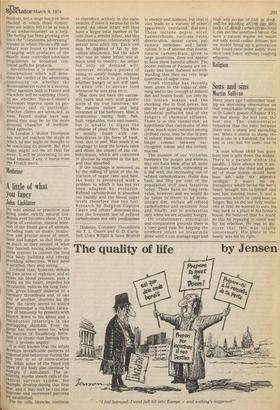A little of what You fancy
John Linklater
No wild animal or primitive man living under strictly natural conditions ever becomes obese. In the course of evolution, natural selection of the fittest gave all animals, including man, an innate, instinctive and precise sense of smell, taste and hunger, so that they ate as much as they needed of what they fancied, having adequate enzyme systems to convert the food Into body building and energy Providing substrates. When need is satisfied, they stop eating.
,Civilised man, however, defeats his own sense of repletion, and so raises his blood pressure, puts a strain on his heart, impedes his circulation, reduces his lung function, gives himself diabetes or a coronary thrombosis and, in one Way or another, shortens his life ,sPan. He rarely seems to notice now grotesque a michelin caricature of humanity he presents with Paunch down to his knees and a irialadorous intertrigo in the overlapping skinfolds. Even the goose has more sense for, when the natives of Strasbourg forceTeed it to create that famous fatty liver, it protests angrily. It is well known that the infant develops ineradicable patterns of ,rsPonse and behaviour during the l!rst year or so of extra-uterine life, while some of the fixed cell types of the body also continue to ITiultiply if stimulated. The insulating, myelin sheath cells of the central nervous system, for example, develop during that first Year, and it may well be tills that response and movement patterns are established.
The fat cells, likewise, continue to reproduce actively in the early months, if there is surplus fat to be stored. An obese infant will thus have a larger total number of fat cells than a slender infant, and this disadvantageous relationship will persist into adult life. Each cell may be depleted of fat by herculean abstinence, but the adult who was an obese infant will always tend to obesity. An infant fed only on demand will, moreover, develop a pattern of eating to satisfy hunger, whereas an infant which is given food whether hungry or not will tend, in adult life, to devour food whenever he sets eyes on it.
Man does not have the carnassial teeth and very acid gastric juices of the true carnivore, nor the massive molars and long intestines of the herbivore. Man is omnivorous, eating flesh, fish, fruit, vegetables, nuts and insects, but is unable to digest the cellulose of plant fibre. This fibre is usually found with carbohydrates in the form of husk, bran, skin or peel. Man needs it as roughage to keep the bowels open and dilute the impact of the carbohydrates, which are converted to glucose by enzymes in the gut, and thus absorbed.
If the roughage is removed, as by the milling of grain or the extraction of sugar cane and beet, the body is presented with a problem to which it has not yet been adapted by evolution. Refined carbohydrate is absorbed too rapidly and the blood sugar levels therefore rise too fast. Research by Surgeon Captain Cleave and others* demonstrates that the frequent use of refined carbohydrate not only predisposes
* Diabetes, Coronary Thrombosis etc T. L. Cleave and G. D. Campbell. (John Wright & Sons, Bristol)
to obesity and diabetes, but that it also leads to a variety of other, apparently unrelated, diseases. These include peptic ulcer, haemorrhoids, varicose veins, diverticulitis, dental caries, pulmonary embolism and furunculosis. It is of interest that coarse, natural carbohydrate, given in large quantities, does not appear to have these harmful effects. The poorer natives .of Panama are virtually free from diabetes notwithstanding that they eat very large quantities of sugar cane.
Fresh stimulus has recently been given to die value of slimming and to the concept of natural diet and health foods, not only by the lenten season and the shocking rise in food prices, but also by our growing awareness of industrial pollution and of the dangers of chemical effluent. There is in this connection, an hypothesis that carcinoma of the colon, much more common among civilised races, may be due in part to colonic stasis and consequently longer contact between carcinogenic toxins and the colonic mucosa.
The passion of our Victorian forebears for purges and enemas may not have been, after all, quite so wide of the mark, coinciding as it did with the increasing use of refined carbohydrates. Habit dies hard, and fifty per cent of the population still uses laxatives today. These have no long-term value, however, and we would do far better to revert to an evolutionary diet, eschew all refined carbohydrate and synthetic food and, finally, eat in moderation only when we are actually hungry.
On evolutionary, ethological and comparative grounds there is a very good case for keeping the newborn infant on breastmilk alone until it can manage eggs and fruit and scraps of fish or meat, and for avoiding all the gay little packs of added carbohydrate until it can eat the unrefined forms. On such a natural regime we would not only avoid coeliac disease, but we would bring up a generation who could once more safely trust their own fancy without courting adiposity.


































 Previous page
Previous page